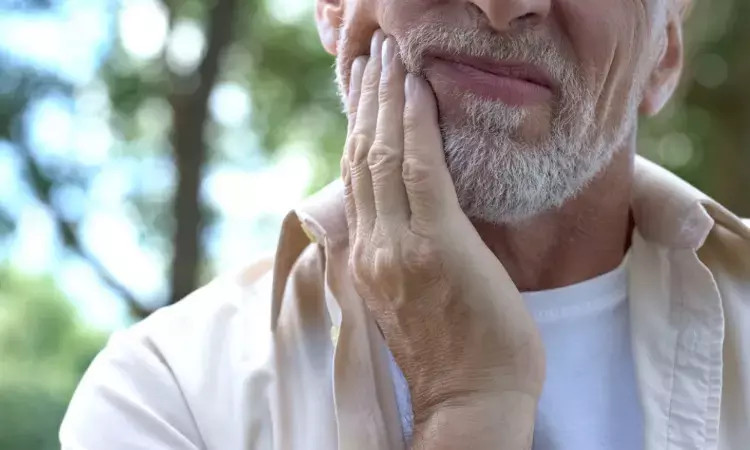- Home
- Medical news & Guidelines
- Anesthesiology
- Cardiology and CTVS
- Critical Care
- Dentistry
- Dermatology
- Diabetes and Endocrinology
- ENT
- Gastroenterology
- Medicine
- Nephrology
- Neurology
- Obstretics-Gynaecology
- Oncology
- Ophthalmology
- Orthopaedics
- Pediatrics-Neonatology
- Psychiatry
- Pulmonology
- Radiology
- Surgery
- Urology
- Laboratory Medicine
- Diet
- Nursing
- Paramedical
- Physiotherapy
- Health news
- Fact Check
- Bone Health Fact Check
- Brain Health Fact Check
- Cancer Related Fact Check
- Child Care Fact Check
- Dental and oral health fact check
- Diabetes and metabolic health fact check
- Diet and Nutrition Fact Check
- Eye and ENT Care Fact Check
- Fitness fact check
- Gut health fact check
- Heart health fact check
- Kidney health fact check
- Medical education fact check
- Men's health fact check
- Respiratory fact check
- Skin and hair care fact check
- Vaccine and Immunization fact check
- Women's health fact check
- AYUSH
- State News
- Andaman and Nicobar Islands
- Andhra Pradesh
- Arunachal Pradesh
- Assam
- Bihar
- Chandigarh
- Chattisgarh
- Dadra and Nagar Haveli
- Daman and Diu
- Delhi
- Goa
- Gujarat
- Haryana
- Himachal Pradesh
- Jammu & Kashmir
- Jharkhand
- Karnataka
- Kerala
- Ladakh
- Lakshadweep
- Madhya Pradesh
- Maharashtra
- Manipur
- Meghalaya
- Mizoram
- Nagaland
- Odisha
- Puducherry
- Punjab
- Rajasthan
- Sikkim
- Tamil Nadu
- Telangana
- Tripura
- Uttar Pradesh
- Uttrakhand
- West Bengal
- Medical Education
- Industry
Tooth Occlusion and Dementia: Study Links Posterior Occlusal Contact Loss to Higher Dementia Risk

A recent study published in the Scientific reports suggests that posterior occlusal contact loss is linked to higher dementia risk.
This study examines the association between posterior occlusal contact and the risk of dementia development in the Japanese population, utilizing Eichner classification to evaluate occlusal status. Data from Japanese health insurance claims were analyzed for the period from April 2016 to March 2022.
Participants had undergone specific health checkups, had no prior history of dementia, and were classified according to their dental occlusal contact. Dementia diagnoses were determined using ICD-10 codes, and participants were divided into three groups-A, B, and C-based on the Eichner classification, which indicates the extent of occlusal contact. Over an average follow-up period of 35.6 months, 691 dementia were identified among 931,309 participants.
Those diagnosed with dementia were more likely to belong to Eichner B and C groups, signifying reduced occlusal contact. After adjusting for covariates, the hazard ratios (95% confidence intervals) for Eichner B and C were 1.73 (1.31–2.28) and 2.10 (1.35–3.26), respectively. Sensitivity analyses confirmed these findings in adults aged 60–75. These findings suggest that reduced posterior occlusal contact correlates with an increased risk of dementia. Since the study is limited to participants under the age of 75, further research is required to determine its generalizability to older populations.
Reference:
Miyano, T., Tamada, Y., Kusama, T. et al. Longitudinal association between posterior occlusal contact and dementia development in a large retrospective cohort study using a Japanese claims database. Sci Rep 14, 27513 (2024). https://doi.org/10.1038/s41598-024-79399-8
Dr. Shravani Dali has completed her BDS from Pravara institute of medical sciences, loni. Following which she extensively worked in the healthcare sector for 2+ years. She has been actively involved in writing blogs in field of health and wellness. Currently she is pursuing her Masters of public health-health administration from Tata institute of social sciences. She can be contacted at editorial@medicaldialogues.in.
Dr Kamal Kant Kohli-MBBS, DTCD- a chest specialist with more than 30 years of practice and a flair for writing clinical articles, Dr Kamal Kant Kohli joined Medical Dialogues as a Chief Editor of Medical News. Besides writing articles, as an editor, he proofreads and verifies all the medical content published on Medical Dialogues including those coming from journals, studies,medical conferences,guidelines etc. Email: drkohli@medicaldialogues.in. Contact no. 011-43720751


